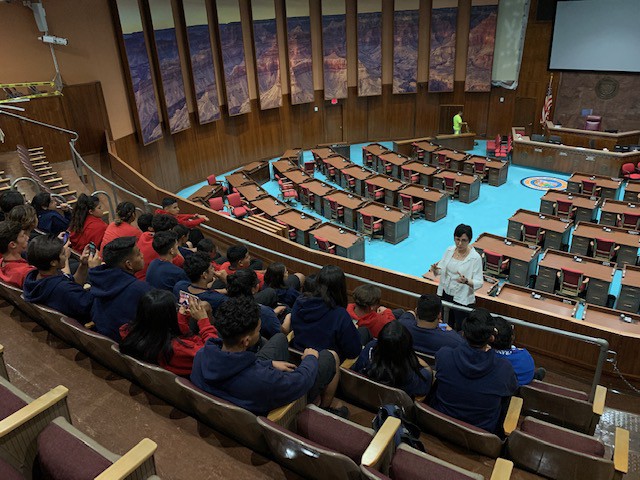
Civics. We all know what that means, right? We want to further democracy by creating students who think about their role in our greater community. We want them to vote, to serve on juries, and to speak intelligently about the issues that we face as a society. We want them to be thoughtful, respectful, law-abiding, engaged, and responsible citizens. No big deal. What this looks like in the classroom varies across the state and, for that matter, across districts. Then, they leave the classroom and get hit with the reality that civically-minded is a lot messier and not so clear-cut. Yet, it is in those shades of gray that democracy is forged. For that reason, Franklin Police and Fire High School seniors visit the state capitol every year for a round table discussion with their representatives, a discussion that often asks messy questions in a state riddled with controversy, questions like, “is being brown probable cause?” and “why are you building prisons based on third-grade failure rates?”
Franklin students have tough questions because most have had tough lives. Our population is 95 percent Hispanic, 100 percent free and reduced lunch, and many are the first in their families to graduate high school. “I value my parents’ sacrifices and I know that my responsibility is to receive an education and represent others who cannot stand up for themselves.” Said one senior, Paola.
Franklin is a public safety school, meaning that the majority of the students have chosen to be there because they want to serve as police officers, firefighters, EMTs. About ten percent go on to military service. I have always been impressed with the dedication of my students but never more than this year when I saw my students’ capstone projects.
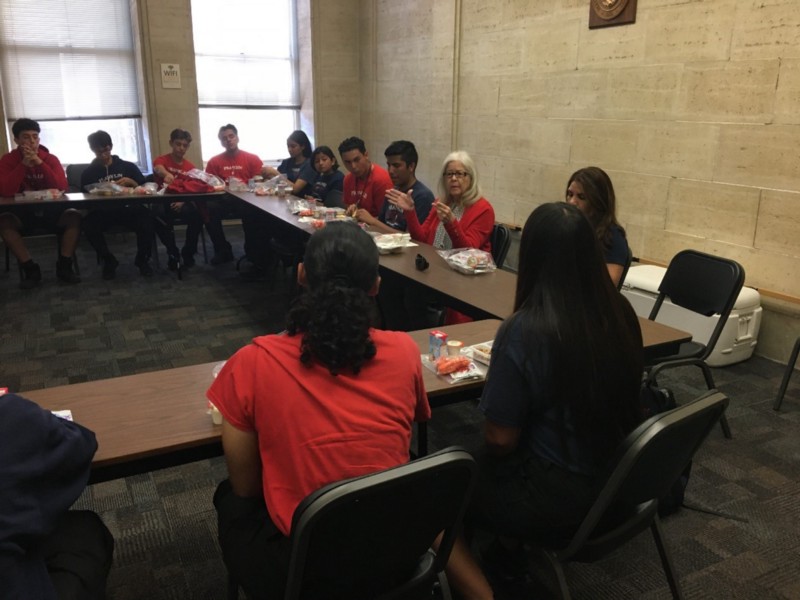
Those who follow the news realize that Arizona has been at the heart of heavy-hitting issues around immigration and deportation. SB1070 made national news and our “toughest sheriff” in Arizona faced litigation for his practices. The questions students posed at the seventh annual round table luncheon stem largely from the reality they live on a daily basis and were the basis of many senior capstones. Their topics ranged from addressing teenage homelessness to teaching elementary students about protecting themselves from Hepatitis A.
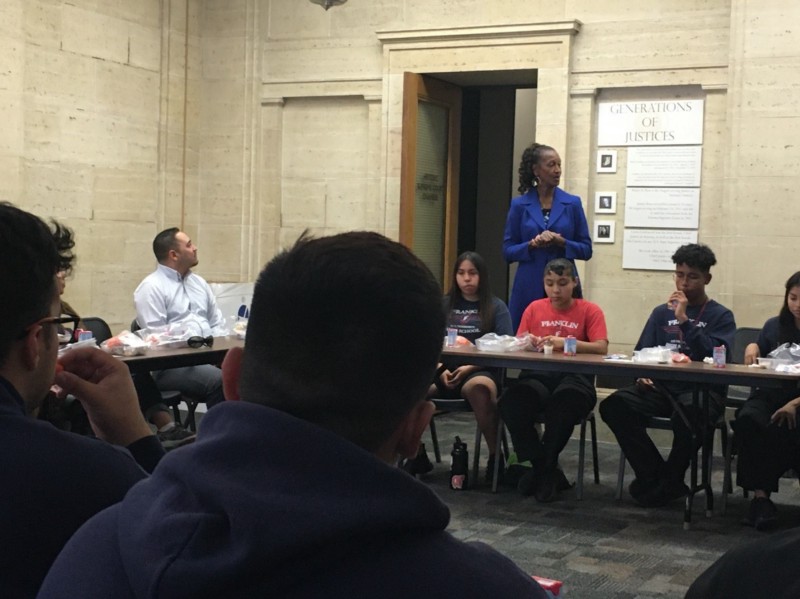
Arizona Corporation Commissioner Kennedy fielded questions from students who wanted to know what the corporation commission was doing to address the fact that Arizona senior citizens were facing a crisis when a rate increase caused the death of a senior citizen who could not afford her electricity bill. Commissioner Kennedy replied that measures had been taken to avert any such catastrophes in the future. (In fact, APS has now been blocked from turning off the electricity in the months where Phoenix temperatures soar above 100 degrees.) Students found themselves deeply engaged in civic issues and collaborated about their very public actions. “The government does do things to help the “poor” but honestly, it’s not even enough. I still see parks full of the homeless and usually, the homeless that are helped are the ones that make it onto social media,” said Julian, one of the seniors who admits that he and his sisters are mostly living the American dream, but his parents and their generation are not. Julian is a first-generation Mexican American.
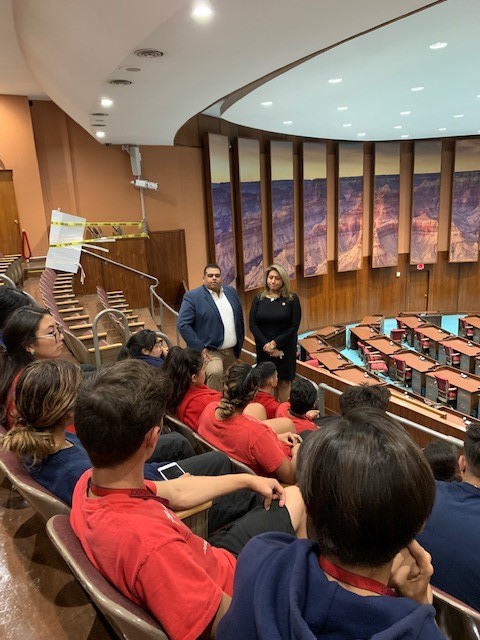
Students concluded their trip with a visit to the House of Representatives where they were surprised by Speaker of the House Russell (Rusty) Bowers, who took a personal interest in the students, leading them through a private tour of the floor and even his chambers. “I felt very special that they took the time to talk to us as well. It’s not every day you get to talk to representatives of our state. I imagine that they’re always busy.”
Students were personally moved, getting to know their legislators and speaking with them face to face. Julian summarized the impact. “It was touching to find out that one of our representatives was a homosexual. He was even Mexican. It also shows that they’re down to earth people. They’re not god, not powerful Individuals, but human beings like us. The guts to admit that was pretty manly. It could’ve also impacted his spot in the legislature, but he still took the risk and succeeded. It helps show people that they’re people like them and they have no reason to hide what they are and who they are. Anyone can be anything and he proves that by representing our state.”
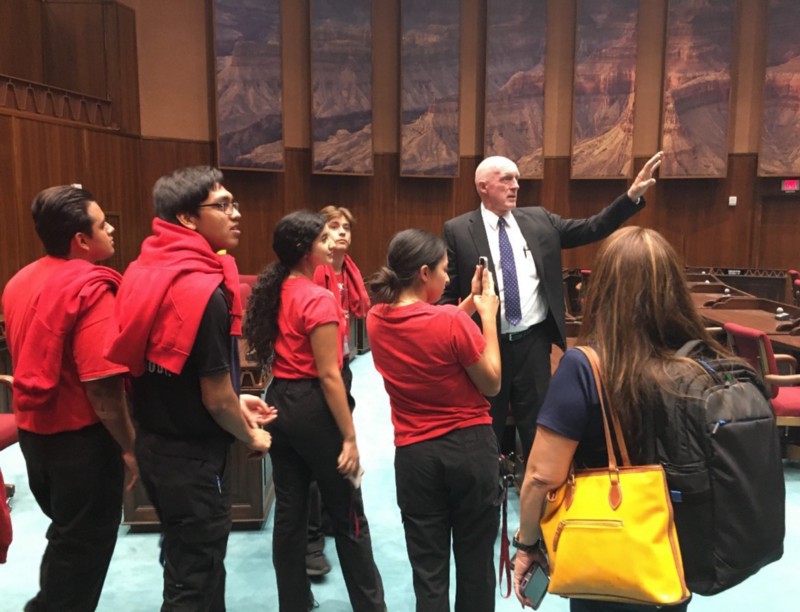
Heidi Bonfante has served as a high school teacher for 30 years and in the capacity of an administrator for the last fifteen years. She earned her BA in secondary education, with an emphasis in both English and political science from the University of Arizona. Heidi holds an MA in Secondary Education, with an emphasis on Special Education and reading and a second MA in Educational Leadership from Northern Arizona University. She holds a National Board certification in English/Language Arts and is currently finishing her doctorate on at-risk student populations. She earned the title of Master Teacher Mentor, a state-level designation, and is currently serving as her school’s mentor educator. Heidi also serves on the iCivics Educator Network.
— — — — —
The views expressed in this blog reflect the views of the author alone and do not reflect the views of the CivxNow Coalition or iCivics. CivxNow and iCivics do not endorse, verify or represent the accuracy, completeness or reliability of any opinion, statement, recommendation or other information written by a third party and published on the CivxNow blog.


 See All
See All